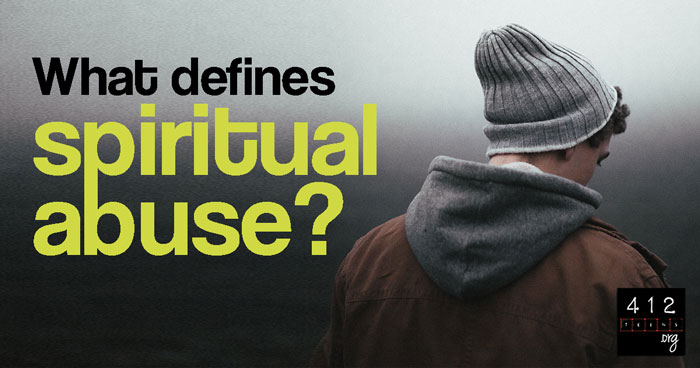What is spiritual abuse?

Musician Audrey Assad tweeted, "Experiencing spiritual abuse (or abuse of any kind probably) has many horrible effects, one of which is the constant longing to know what life you would have had, had the abuse never happened. It's a question that can never be answered, but always feels urgent."
The definition of "abuse" is "to treat in a harmful, injurious, or offensive way." There are many different types of abuse in the world: physical, emotional, sexual, verbal, etc. Spiritual abuse occurs when the Word and Authority of God are misused to place unbiblical stipulations on salvation and a relationship with God.
Spiritually-abusive groups may insist they are the only ones God speaks to or that their interpretation of God's Word is the only "right" one. They may place great emphasis on the "performance" of their congregants, such as attending every meeting, donating time and money when and where the leaders designate, or producing a certain number of "converts."
Additionally, spiritually-abusive leaders will pile on the guilt if one's performance is unsatisfactory and may use Hebrews 13:17 (“Have confidence in your leaders and submit to their authority”) to demand blind loyalty and unthinking obedience to their leadership. None of these things is OK. Our loyalty should always be to Jesus, who is the true Head of the Church (Ephesians 1:22)—not a particular organization, church, or leader.
Spiritual Abuse in the Bible
Spiritual abuse is not a new thing. Peter warned that "there will be false teachers among you" (2 Peter 2:1). As he described these false teachers, he made it clear there would be abuse of their followers: "In their greed these teachers will exploit you with fabricated stories" (2 Peter 2:3). Jesus has some pretty harsh words for the Pharisees who used their status as spiritual authorities to take advantage of people:
"But woe to you, scribes and Pharisees, hypocrites! For you shut the kingdom of heaven in people's faces. For you neither enter yourselves nor allow those who would enter to go in... Woe to you, blind guides, who say, ‘If anyone swears by the temple, it is nothing, but if anyone swears by the gold of the temple, he is bound by his oath.' You blind fools! For which is greater, the gold or the temple that has made the gold sacred?" —Matthew 23:13, 16-17

Peter had some choice words to say to the Pharisees as well: "Now, therefore, why are you putting God to the test by placing a yoke on the neck of the disciples that neither our fathers nor we have been able to bear? But we believe that we will be saved through the grace of the Lord Jesus, just as they will" (Acts 15:10-11).
In the Old Testament, God (through the prophet Jeremiah) condemns the spiritual leaders in Jeremiah 23:1-2, which says, "'Woe to the shepherds who destroy and scatter the sheep of my pasture!' declares the Lord. Therefore thus says the Lord, the God of Israel, concerning the shepherds who care for my people: ‘You have scattered my flock and have driven them away, and you have not attended to them. Behold, I will attend to you for your evil deeds, declares the Lord.'"
There are many more examples of spiritual leaders being called out for abusing their spiritual authority. Some Christians have grown up with pastors who were treated as perfect beacons that command absolute authority over every person in the congregation—never to be questioned. But the Bible calls out corrupt leaders rather than letting them off the hook just because of their position. Misuse of spiritual authority is never to be taken lightly.
Spiritual Abuse Today
Spiritual abuse is rarely inflicted on purpose. Sometimes spiritual abuse is born out of "good intentions." People are spiritually abused because the abuser authentically believes that the abusive tactics are necessary to help the victim be a "good Christian" or to keep the loved one "spiritually safe." This behavior generally does not come from a desire to harm but from a misunderstanding of the grace of God (Acts 15:10-11), bad theology, and fear.
Of course, not all abuse stems from bad theology. Spiritually abusive leaders can be blinded by a lust for power or their own belief that they can't mistakes. Over the years, there have been many cases of spiritual leaders being accused (and charged) with abuse of all kinds. Sometimes these leaders even admit to the abuse but don't see anything wrong with it! Often these leaders had garnered a celebrity-like status leading them to believe they are above the legal law and above the example of Christ.
No matter the recognized or unrecognized motive of the abuser, abuse born out of good intentions is still abuse. Spiritual abuse (or abuse of any kind) is never endorsed by the God of the Bible.
What are the effects of Spiritual Abuse?
One of the cruelest effects of spiritual abuse is the violation of the soul. A victim of spiritual abuse can suffer from severe levels of trauma. Survivors may still retain that deep-seated need in their heart for God, but they don't know how to reach Him anymore. They may hate God but still fear damnation. Or, if their only exposure to Him has been messed-up examples of Christianity, they may walk away from God altogether.
Some may excuse corrupt church behavior with statements like, "But God isn't the Church!" While this seems a simple enough explanation, if you grew up in a spiritually-abusive environment that described God as manipulative, condescending, and disgusted with you, then you'll be left with so many hurtful, confusing questions and no answers. "Who is God really? Is everything I learned about God wrong? Is the only real type of love 'tough' love? Is grace a longsuffering, gritted-teeth tolerance of our horribleness?"
Saying "God isn't the Church" is true but learning who God IS and who He is NOT outside of the abusive environment can prove much more complicated.

Many survivors of spiritual abuse struggle to pray and read the Bible. The Bible should be our guiding light to understanding God and His Truth better. But for spiritual abuse survivors, the Bible has been perverted and twisted so often that just looking at it can cause panic attacks, anger flare-ups, anxiety, etc. Even if trauma reactions aren't triggered, abuse survivors may struggle to understand any positive, hopeful interpretations of the Bible.
Similarly, praying should be a comforting, peace-giving experience of talking to God, but what does that look like? Can we be casual? Or is that disrespectful and damning? If the spiritual foundation was corrupted by abuse, the survivor may be fearful of God or not even know how to approach Him in the first place.
But there's always hope.
The God of the Bible doesn't require our understanding and certainty in Him for Him to love us and watch out for us. Even when we don't understand, when we shy away from Him in response to an abusive past, God doesn't change in His love for us (Malachi 3:6).

"Likewise the Spirit helps us in our weakness. For we do not know what to pray for as we ought, but the Spirit himself intercedes for us with groanings too deep for words. And he who searches hearts knows what is the mind of the Spirit, because the Spirit intercedes for the saints according to the will of God." —Romans 8:26-27
Christians—even deeply broken ones—have the Holy Spirit living inside of us (John 14:16-17). When we've lost all ability to ask for help we're not cut off from God. Instead, the Holy Spirit still tells God the needs and pains of our hearts. We don't need to perfectly express our pain in words for God to care about and help us through it.
"For we do not have a high priest who is unable to sympathize with our weaknesses, but one who in every respect has been tempted as we are, yet without sin. Let us then with confidence draw near to the throne of grace, that we may receive mercy and find grace to help in time of need." —Hebrews 4:14-16
ALSO SEE: What are some signs of spiritual abuse?


TL;DR
Spiritual abuse occurs when the Word and Authority of God are misused to place unbiblical stipulations on salvation and a relationship with God. Spiritual abuse is recorded throughout the Bible, when spiritual leaders used their status to exploit their flocks (Matthew 23:13; Matthew 23:16-17; Acts 15:10-11; Jeremiah 23). Today, spiritual abuse can be born out of good intentions, a lust for power, or even delusions of grandeur. Regardless of the cause, spiritual abuse is never endorsed or treated lightly by God. Unfortunately, spiritually abusive communities muddy the difference between God's character and the community's counterfeit of God's character. Survivors of spiritual abuse often have varying degrees of trauma. Fortunately, God doesn't require us to understand everything or even understand Him for Him to love and help us. There is always hope, and healing is possible.

Writer/Editor: September Grace
September is an avid film nerd from growing up on weekend trips to Universal Studios Hollywood. She is passionate about the intersections of Christian spirituality, faith, and storytelling in popular culture. Outside of 412teens and digging up obscure horror flicks from the 2000s, she works as a freelance developmental editor and acquisitions consultant while comforting her clingy feline floof, Faust, from the anxiety of existence.
